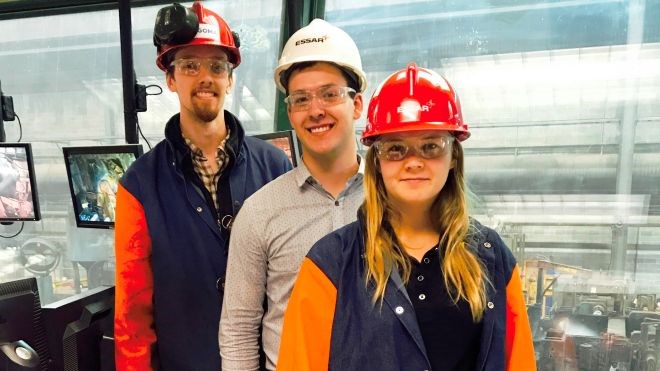With the number of people eligible to retire from Algoma reaching the hundreds, the Sault Ste. Marie steel plant has created its own succession program to ensure all that knowledge and expertise isn’t lost.
For the last four years, the company (formerly known as Essar Steel Algoma) has been running its Graduate Engineer Training Program, a 12-month training course designed to prepare new engineers for various leadership roles at Algoma.
“There's a good chunk of baby boomer-type people that are going to be leaving the company in the next few years,” said Algoma’s general manager, Dave Clingen, who oversees the program.
“We recognize that, in addition to the people we have on staff, we wanted to start to develop some newer people, and in the future maybe they can take some of those leadership-type roles across the company.”
Brenda Stenta, Algoma’s manager of corporate communications, said up to 700 people are currently eligible to retire. While that doesn’t mean they will all choose to retire simultaneously, “we need to start to turn our mind to knowledge transfer and succession planning,” she said.
Eligible candidates for the program include graduates with a four-year degree in chemical, mechanical, electrical, civil, or materials and metallurgical engineering.
The program consists of a rotation through nine various departments, shadowing supervisory and technical roles, classroom training, and networking opportunities.
“For each of the areas, they may be there for a month or two months, depending on their discipline, and get some exposure to the process, and also the process of managing the area,” Clingen said.
“Shadowing is looking to see how the incumbent people do their job…so they get exposure to all the various roles in all of the operating areas and service areas.”
Participants are also given a major project — called a “compass project”— to complete through the program. It’s specific to their discipline, and they work on it for six to eight months through the program.
“They're all real issues that they need to resolve and propose a solution, and in some cases we actually implement the solution while they're in that role,” Clingen said.
For many incoming candidates, although they know they want to work in a technical role, they aren’t clear on how they can apply their skills, or what specific job they want to do, Clingen said. Spending time in each department gives them a chance to see what each role entails.
It also works in the company’s favour, because Algoma can determine how that future employee will best fit into the operation.
“Not only does the program give the candidate the opportunity to have exposure to all those different operating and service areas and roles throughout the organization, but it gives the organization a better understanding of that candidate's strengths and interests,” Stenta said.
“So when they complete the program in 12 months, we have a better sense of what would be the ideal fit, what would be the ideal role, what would be the best career development plan for that particular individual and how best can they contribute to Algoma's success.”
This upcoming cohort is now the third group to go through the program, and each contingent has anywhere from eight to 14 people training at one time. Clingen estimates 16 people have successfully completed the program altogether.
The company receives thousands of applications, from the Sault, across Ontario, and even internationally, but they go through a careful vetting process to ensure they’re the right fit for the company. Stenta said they’ve had the most success with candidates who are from Northern Ontario.
“Just from a retention perspective, it's been our experience that people that are from the North or that have some sort of roots or connection with the North, they tend to be a better fit and they're more likely to stay for the long term,” she said. “So, from that perspective, we're definitely seeking folks that have some sort of connection or fit with the Northern lifestyle.”
Although the program is geared toward fairly new graduates, Clingen said the company is open to accepting engineers who have graduated from an engineering program, but amassed experience in other sectors. Even if someone doesn’t have familiarity working in steel, “we’ll give you experience in steel,” he said.
Stenta noted that the company additionally has a similar succession plan in place for trades workers, through its Trades Apprenticeship Program. For that initiative, Algoma is seeking workers in a variety of trades, including mechanical maintenance, electrical maintenance, bricklayers, hoisting engineers, HVAC technicians and machinists.
“We currently have approximately 44 individuals in the midst of completing their apprenticeship, and we've just approved another 32 to move into the apprenticeship program,” Stenta said.
“That's a very robust cohort, and we recruit those individuals from not only within our current labour force, but we also look outside on occasion.”




